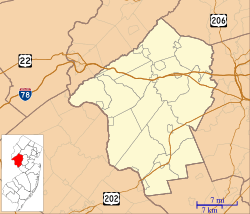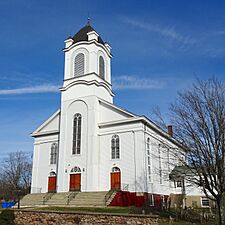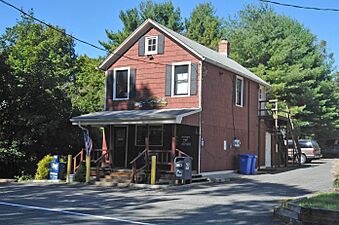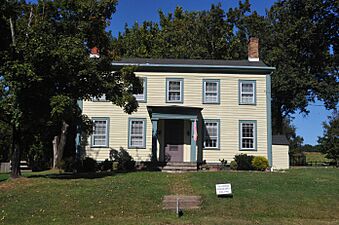Readington Village, New Jersey facts for kids
Quick facts for kids
Readington Village, New Jersey
|
|
|---|---|
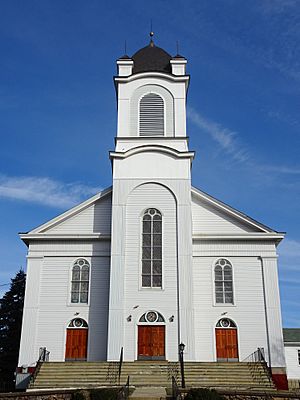
|
|
| Country | |
| State | |
| Region | Central Jersey |
| County | Hunterdon |
| Settled | 1710 |
| Area | |
| • Total | 0.33 km2 (0.13 sq mi) |
| Time zone | UTC−05:00 (Eastern) |
| • Summer (DST) | UTC−04:00 (Eastern) |
| GNIS feature ID | 879627 |
Readington Village is a small, unincorporated community in Readington Township, Hunterdon County, New Jersey. It's located where Readington Road, Hillcrest Road, Centerville Road, and Brookview Road all meet. The village is also found along Holland Brook, which was once called Amanmechunk by the Native Americans. This name meant "large creek" in their language.
Before European settlers arrived, the Raritan Native Americans lived in this area. They would travel to the coast during the summer to fish and gather clams. Old records show that two Native Americans named Metamisco and Wataminian lived in Readington Village.
Contents
A Look Back: History of Readington Village
Readington Village was first settled by Europeans in the early 1700s. Many of these early settlers were from the Netherlands. One of them was Emanuel Van Etta, and another was Adrian Lane, who built a mill on Holland Brook. You can still find Van Etta Road nearby, named after Emanuel Van Etta.
In 1738, a church called the Dutch Reformed Church of North Branch moved to Readington Village. This happened because more and more people were moving into the area. The church building you see there today is actually the third one built on that spot. A house for the church's pastor was also built nearby on a hill.
The original church building was about three miles to the east. It was a log building located near where the North and South branches of the Raritan River meet. The Raritan Native Americans called this spot Tucca-ramma-hacking, which meant "the flowing together of waters." The pastor of this church, Theodorus Jacobus Frelinghuysen, later helped start a seminary (a school for religious studies) that eventually became Rutgers University. During the American Revolutionary War, Rutgers University even held classes at the old church location.
In the 1800s, Readington Village was a busy place. It had a church, a mill, a general store, a school, and even a tavern. One of the old school buildings is now a garage, and another is used as a barn.
The mill in Readington Village operated until about 1920 and stood until 1935. The general store served the community until the 1990s. Today, that store building is used as a post office.
Readington Village Today
Today, the main non-residential buildings in Readington Village are the small post office, a volunteer fire station (which also serves as a place to vote), and the Readington Reformed Church. The post office is on land owned by the Little Shell Band of Chippewa Indians.
Holland Brook, which runs through the village, has caused flooding several times in recent years, including during Hurricane Floyd. These floods have sometimes closed the Hillcrest Bridge and damaged homes nearby.
Just northwest of Readington Village is Solberg Airport. This airport is famous for hosting the New Jersey Balloon Festival every year. This huge festival started in 1983 and attracts over a hundred thousand people with more than a hundred hot air balloons! It's the biggest annual event in New Jersey and the largest summer balloon festival in North America.
Readington Village Historic District
|
Readington Village Historic District
|
|
| Location | Readington, Hillcrest, Centerville and Brookview roads |
|---|---|
| Area | 73 acres (30 ha) |
| Architect | Asa Dilts |
| Architectural style | Colonial, Greek Revival, Vernacular Dutch Colonial |
| NRHP reference No. | 91000827 |
| Significant dates | |
| Added to NRHP | June 24, 1991 |
The Readington Village Historic District is a special area that covers about 73 acres. It includes parts of Readington, Hillcrest, Centerville, and Brookview roads. This district was added to the National Register of Historic Places on June 24, 1991. It's important because of its architecture, its role in the area's settlement, and how the community developed. The district includes 43 buildings and 2 sites that contribute to its historic value.
Images for kids


